
The Tenth Doctor is an incarnation of the Doctor, the protagonist of the British science fiction television series Doctor Who. He is played by David Tennant in three series as well as nine specials. The character has also appeared in other Doctor Who spin-offs.

Totally Doctor Who is a children's television series produced by the BBC that was originally broadcast between 13 April 2006 and 29 June 2007, accompanying the second and third revived series of Doctor Who. At the time of its original broadcast, Doctor Who, a science fiction programme aimed at a family audience, had no existing children's spin-off; The Sarah Jane Adventures, of which the pilot episode was broadcast on New Year's Day, 2007, would replace the series as the only children's show based on Doctor Who until 2009 when K-9 aired.
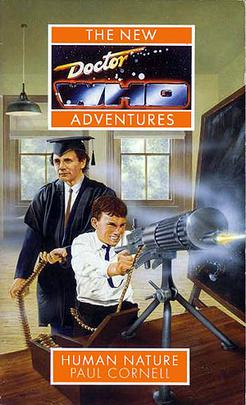
Human Nature is an original novel written by Paul Cornell, from a plot by Cornell and Kate Orman, and based on the long-running British science fiction television series Doctor Who. The work began as fan fiction.

Martha Jones is a fictional character played by Freema Agyeman in the long-running British science fiction television series Doctor Who and its spin-off series, Torchwood. The show's first female black companion, she is a companion of the Tenth Doctor in Doctor Who, after Rose Tyler but before Donna Noble. According to the character's creator Russell T Davies in his non-fiction book Doctor Who: The Writer's Tale, Martha was developed from the beginning with the intention of appearing for the whole of the 2007 series, and to later make guest appearances in subsequent series and crossover appearances in the show's two spin-offs; Martha subsequently made guest appearances in Torchwood series two and in Doctor Who series four in 2008 and special episode "The End of Time" in 2010. Martha was also intended to make guest appearances in the 2009 series of Torchwood and The Sarah Jane Adventures, but could not due to the actress's other work commitments.
"Daleks in Manhattan" is the fourth episode of the third series of British science fiction television series Doctor Who, which was first broadcast on BBC One on 21 April 2007. It is part one of a two-part story. Its concluding part, "Evolution of the Daleks", was broadcast on 28 April.
"The Lazarus Experiment" is the sixth episode of the third series of the revived British science fiction television series Doctor Who. It was broadcast on BBC One on 5 May 2007 and stars David Tennant as the Tenth Doctor and Freema Agyeman as Martha Jones.
"Utopia" is the eleventh episode of the third series of the revived British science fiction television series Doctor Who. It was broadcast on BBC One on 16 June 2007. It is the first of three episodes that form a linked narrative, followed by "The Sound of Drums" and "Last of the Time Lords". The episode serves to re-introduce the Master, a Time Lord villain of the show's original run who last appeared in the 1996 television movie Doctor Who.
"Human Nature" is the eighth episode of the third series of the revived British science fiction television series Doctor Who, which was originally broadcast on BBC One on 26 May 2007. It is the first episode of a two-part story written by Paul Cornell adapted from his 1995 Doctor Who novel Human Nature. Its second part, "The Family of Blood", aired on 2 June. Along with "The Family of Blood", it was nominated for the Hugo Award for Best Dramatic Presentation, Short Form in 2008.
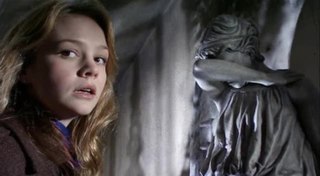
"Blink" is the tenth episode of the third series of the British science fiction television series Doctor Who. It was first broadcast on 9 June 2007 on BBC One. The episode was directed by Hettie MacDonald and written by Steven Moffat. The episode is based on a previous short story written by Moffat for the 2006 Doctor Who Annual, entitled "'What I Did on My Christmas Holidays' By Sally Sparrow".
"The Sound of Drums" is the twelfth episode of the third series of the revived British science fiction television series Doctor Who. It was broadcast on BBC One on 23 June 2007. It is the second of three episodes that form a linked narrative, following "Utopia" and followed by "Last of the Time Lords".

"Gridlock" is the third episode of the third series of the British science fiction television series Doctor Who, which was first broadcast on BBC One on 14 April 2007. It was written by Russell T Davies and directed by Richard Clark.
"The Sontaran Stratagem" is the fourth episode of the fourth series of the British science fiction television series Doctor Who, which depicts the adventures of a time-travelling humanoid alien known as The Doctor. The episode was broadcast on BBC One on 26 April 2008. The episode and its sequel, "The Poison Sky", were written by Helen Raynor, who previously wrote the linked episodes "Daleks in Manhattan" and "Evolution of the Daleks" in the third series.
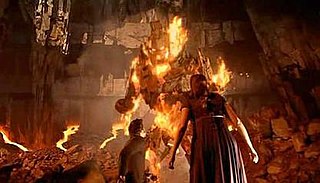
"The Fires of Pompeii" is the second episode of the fourth series of the British science fiction television series Doctor Who. It was broadcast on BBC One on 12 April 2008. Set shortly before and during the eruption of Mount Vesuvius in AD 79, this episode depicts alien time traveller the Doctor and his new companion Donna Noble on a trip to Pompeii, where they uncover an alien invasion. Their clashing worldviews present an ethical dilemma for the Doctor.
"Silence in the Library" is the eighth episode of the fourth series of the revived British science fiction television series Doctor Who. It was first broadcast on BBC One on 31 May 2008. It is the first of a two-part story; the second part, "Forest of the Dead", aired on 7 June. The two episodes make up the second two-parter Steven Moffat contributed to the series after "The Empty Child" and "The Doctor Dances" from the first series. It is also the final story that Moffat wrote before replacing Russell T Davies as head writer and showrunner starting from the fifth series in 2010.
"The Doctor's Daughter" is the sixth episode of the fourth series of British science fiction television series Doctor Who. It was broadcast on BBC One on 10 May 2008.

"Journey's End" is the thirteenth and final episode of the fourth series of the British science fiction television series Doctor Who, which was first broadcast on BBC One on 5 July 2008. It is the second episode of a two-part crossover story featuring the characters of spin-off shows Torchwood and The Sarah Jane Adventures, preceded by "The Stolen Earth", which aired on 28 June. At 65 minutes in length, it was approximately 20 minutes longer than a standard fourth-series episode. It marked the final regular appearances of every companion introduced in the Russell T Davies era, including Catherine Tate as Donna Noble.

The third series of the revived British science fiction programme Doctor Who, and the twenty-ninth season of the show overall, was preceded by the 2006 Christmas special "The Runaway Bride". Following the special, a regular series of thirteen episodes was broadcast, starting with "Smith and Jones" on 31 March 2007 and ending with "Last of the Time Lords" on 30 June 2007. In addition, a 13-part animated serial was produced and broadcast as part of Totally Doctor Who.
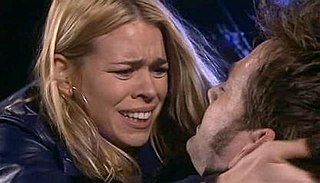
"The Stolen Earth" is the twelfth episode of the fourth series and the 750th overall episode of the British science fiction television series Doctor Who. It was first broadcast on BBC One on 28 June 2008. The episode was written by show runner and head writer Russell T Davies and is the first of a two-part crossover story with spin-offs Torchwood and The Sarah Jane Adventures; the concluding episode is "Journey's End", the finale of the fourth series, broadcast on 5 July.
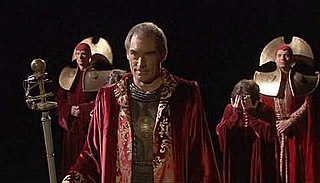
"The End of Time" is a two-part story of the British science fiction television series Doctor Who, originally broadcast in the United Kingdom on BBC One on 25 December 2009 and 1 January 2010. It is the fifth Doctor Who Christmas special and the last entry in a series of specials aired from 2008 to 2010. It marks the final regular appearance of David Tennant as the Tenth Doctor and introduces Matt Smith as the Eleventh Doctor. At the time, it was the last Doctor Who story written and produced by Russell T Davies, who shepherded the series' return to British television in 2005 and served as the series's executive producer and chief writer, until he returned to the position in 2022 for the 60th anniversary specials onwards.

The 2008–2010 specials of the British science fiction television programme Doctor Who are series of five specials that linked the programme's fourth and fifth series. The specials were produced in lieu of a full series in 2009, to allow the new production team for the programme enough time to prepare for the fifth series in 2010, in light of Russell T Davies's decision to step down as showrunner, with Steven Moffat taking his place in the fifth series. Preceded by the 2008 Christmas Special, "The Next Doctor", the first special, "Planet of the Dead", was aired on 11 April 2009, the second special "The Waters of Mars", was aired on 15 November 2009, with the last special, the two-part episode "The End of Time", broadcasting over two weeks on 25 December 2009 and 1 January 2010.











